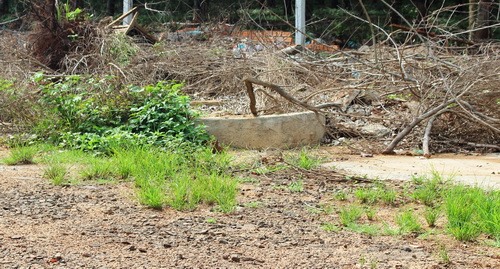 Society
Society

A small well dug in the middle of a coffee plantation has been the lifesaver for the beans in Đắk
 |
| A typical low-edged well in Đắk Lắk Province. - Photo nhandan.com.vn |
ĐẮK LẮK — A small well dug in the middle of a coffee plantation has been the lifesaver for the beans in Đắk
A poor but happy family of three in Ea Tu Commune has now shrunk to just one person: an elderly grandmother named Lê Thanh Hậu.
On a hot sunny day, like many other days in this
Looking to cool himself down after work, Bình sat by a half-covered, low edge well at the plantation. He slipped over into the well. The mother could barely scream for help before jumping into the well trying to save the boy. But she failed and lost her life, too.
Such wells, with edges ranging between 20 and 30cm high, are very common in the area as the farmers wanted to reduce building expenses as much as possible, while paying little attention to safety.
These wells have also led to perhaps the biggest regret in the life of farmer Lê Văn Hậu. He dug a low-edged well in his coffee plantation and left it uncovered for the sake of convenience. Hậu could have never imagined that his only son, just 8 years old, would one day fall down the well and would never be the same again.
The boy survived the tragic fall but a traumatic brain injury transformed the intelligent and active son Hậu had had, he said.
“I have sold most of the plantation to have money for my son’s treatment. But the doctors said it was very hard to have him fully recover,” Hậu said.
“Hope is now the only thing I can cling to.”
A report by the Đắk Lắk Department of Natural Resources and Environment estimated that there were more than 70,000 wells in the province, many of which have witnessed fatal accidents when people, adults and children alike, fall into the wells or are killed inside due to lack of oxygen and gas poisoning.
A funeral for three people a few years ago remains a traumatic shock to the
On that fateful late afternoon, Phạm Ngũ Mạnh climbed down to his family’s well to adjust the water pumping machine he had installed there. His childhood friend, Nguyễn Văn Công could only hear the sound of Mạnh falling to the bottom of the well and his screams for help. Công could not save his friend as he did not know how to swim.
Two good neighbours, Đặng Văn Bình and Bùi Văn Cửu, came to the rescue but as soon as they stepped down to the well, the couple lost consciousness and later died.
A police investigation concluded that the three were killed due to gas poisoning in the well. It was similar to poisoning cases in mines where workers are trapped amid several toxic gases like carbon monoxide, carbon dioxide or methane.
Such gases directly damage humans’ cerebral circulation and might lead to a quick death, the police explained to the villagers. The gases build up slowly inside the wells when they were covered for a long time and do not have any air circulation.
After the funeral, Công went to many other villages nearby to persuade the residents to build their wells’ edges higher and regularly remove the wells’ caps to avoid trapping toxic gases inside.
“But many didn’t listen. They still thought bad things would never happen to them,” he said.
“Some understood what I said but then forgot soon after that.”
But Công and a village elder Đinh A Lung are not giving up yet. Lung, as an elder who has won much respect from the residents in the Chư A Thai Commune, keeps telling everyone to pay more attention to their wells for the sake of their own safety.
“I believe that by reminding people weekly and once ever couple of days for those with children, their minds will eventually change,” Lung said. — VNS




